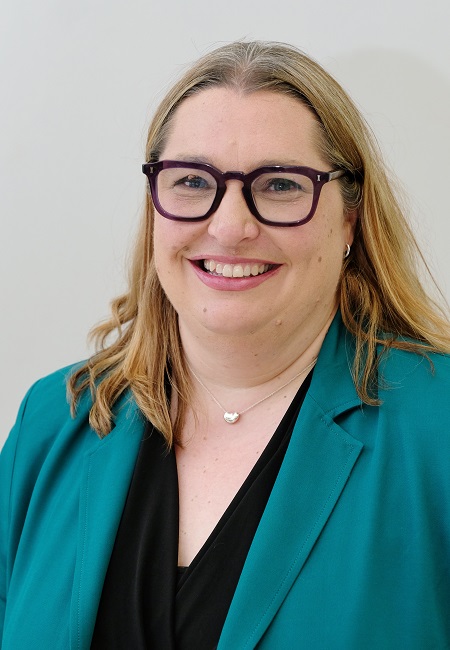Slough Borough Council’s Adele Taylor discusses what it means to take on a role as a section 151 officer in an authority under government intervention, and why the huge challenges it faces makes Slough such an attractive place to work.
Room151’s interview series with s151 officers is sponsored by CCLA Investment Management, whose work with local authorities dates back to 1961.

In hindsight, Adele Taylor’s decision to join Slough Borough Council – an authority that has been under government intervention since 2021 – made perfect sense.
“I’ve realised that in my career so far I’ve done a lot of turnaround jobs. That is what I enjoy doing – fixing problems and solving conundrums,” she tells Room151. “I’m somebody who if I was in a boring, stable job I’d be very dangerous as I’d want to meddle! I’m that kind of person.”
Taylor joined Slough as executive director of finance and commercial, and section 151 officer, just over two months ago. She has a lot on her plate – whether it is fixing the authority’s financial problems, working with the government-appointed commissioners or external auditors Grant Thornton, or initiating a recruitment drive – and already there are many action plans in place and things that Taylor has needed to respond to.
“At the moment it’s trying to pull it all together into one single financial proof of plan, and on a thematic basis. The key is getting the basics right,” she says.
Creating the right culture of finance at the authority is also vital. “Finance is everybody’s business, starting with the councillors – do they understand how finance works and what’s their part to play in decision making? What’s their role in managing the finances? And then everything through to business managers, those who are directly managing budgets,” Taylor comments.
“Previously there was a disconnect sometimes between finance and those people who were actually spending money. Getting the finance culture right underpins everything, including the support that finance can give to the rest of the organisation.”
Reflecting on her opening two months, Taylor notes that there have already been a lot of changes, “not least the political situation”, she says, referencing the local elections. “I can’t believe it’s only been two months in some respects, and I can’t believe it has been two months in some respects,” she says.
Starting any new organisation makes for an interesting situation, but there are particular challenges to working at a council which is under government intervention. “It is about understanding the world you are working in, and what intervention means. Because until you are actually in it, you don’t really understand necessarily what extra support, as well as what extra governance, there is,” she says.
“In some ways it’s quite freeing because you realise that the changes you are going to have to make are big, and you’re going to have to make them – this isn’t going to be the small incremental intuitive changes that you would normally do in any other job.
“I think you also have to come in and hit the ground running a lot more than you would in another role, because from day one there’s an expectation [on you].”
Fortunately, Taylor is someone who relishes a challenge, and “relishes needing to hit the ground running, so it fits me well”.
Building a new team
It hasn’t just been the s151 position that has changed at Slough Borough Council in recent times. Indeed, there have been many people new to the organisation. “So we’re having to do things very quickly, because we’re being relied upon to get things done at pace,” Taylor says.
There will be even more new staff soon, as Taylor embarks on a recruitment drive. With a lot of interims staff in place and a number of leavers, she is having to build a new team. But isn’t she worried that Slough won’t be seen as a good place to work, given its current circumstances?
Quite the contrary – for the right person. “I think what’s interesting about this recruitment is that the kind of people that we’re probably going to attract are very different,” she says. “We’re going to make permanent changes by having permanent people in place.
“There’s a recruitment challenge in local government full stop, and often we end up chasing the same people, whether it’s interim or permanent. I think with Slough, I’m starting to see people who are happy in their job and wouldn’t normally be thinking about moving, but see Slough as a very interesting challenge and one that could be career-defining, where they will get to do things that they wouldn’t be able to do anywhere else.”

The candidate profile is someone who “might be a chess player, or who likes conundrums or puzzles; it’s great because there’s a chance to unknot things and you need to break some of the existing practices and remake something better,” says Taylor.
Another goal of the recruitment drive is getting local residents involved. “They can really make a difference – I think the big thing with Slough was that they had slightly lost their way with that connectivity with residents. In some of the roles I am recruiting for I really want to go for local residents, as it’s really important to have this connectivity, and local residents have got such a part to play,” she says.
“The council hasn’t necessarily served them well, so why not be a part of getting it back to serving its residents well?”
Understanding the nuances
Taylor is also keen to stress that it is wrong to “lump together” all councils that are struggling financially, as if the causes and problems were all the same. “Slough is in a slightly different position because of the fact that we have got assets to sell, and there is a potential route out of the financial trouble,” she says. “I think the differentiating factor sometimes is just understanding the nuances of what happened and why it happened, but also what the routes out could be. There are lessons to be learned.”
Indeed, other councils are going to get into financial trouble in the future – and Taylor thinks it won’t necessarily be for the same reasons. Instead, it will be because of a lack of funding, she says.
The most recent council to issue a section 114 notice and to be placed under government intervention is Woking Borough Council, which has received criticism for the level of borrowing it undertook and its actions investing in big regeneration projects. But Taylor says it would be wrong to conclude that other councils should steer clear of regeneration and local investment because of the risks involved.
“It’s about how you do the investment; the decisions you take and the information you base it on,” she says. “We’ve got to get away from this view that investing in your local area equals bad. We can’t paralyse ourselves to the point that as a sector we’re not willing to invest in our own areas, because otherwise some really good stuff that could happen, won’t happen. Regeneration is really important, and if done well is such a benefit to local communities. If we don’t do that, we’re still going to end up financially unsustainable. It’s about understanding the size of the risk, and that’s where things have gone wrong, where the size of risk hasn’t been fully appreciated.”
15th Annual LATIF & FDs’ Summit – 19 September 2023
250+ Delegates from Local Government & Investment
In Slough, she says problems arose “around the mechanics” of investment. Investing itself was not the wrong decision, but it was the scale that it was done at that caused issues.
“But you also have to ask why some of it was done in the first place, and the reason is the funding in local government generally,” Taylor adds. “It’s getting the balance right between enough investment that it’s going to make a difference and going to make change and regenerate an area, and knowing why you’re doing it, and also knowing the risks of doing it. Do you need to partner with somebody else to perhaps de-risk some of it? Those things are really important.”
Taylor thinks that the “right people with the right skills” haven’t always been the ones working on such projects. “If you’re working in a highly commercial world, you need people with commercial skills and expertise, and knowledge and connections,” she says.
“We have to be really careful that we don’t vilify what could have felt like good decisions, but we should question where people haven’t considered and managed the risk, and haven’t had the long-term foresight to think about what they need to do. That’s when it starts impacting on residents, and if it starts negatively impacting on our residents, we know that we haven’t done something right, and let’s learn from that.”
The changing role of the s151
Indeed, these problems highlight the changing role of the section 151 officer. “As a s151 officer you need to be somebody who is professionally curious. Where sometimes you can fall foul is not being professionally curious enough,” Taylor remarks. “We’re plate spinners; we’re having to manage demand, understand how the pieces fit together.”
Taylor’s service finance background has given her an advantage, she thinks. “I was on the service business partner side, which can be a strength sometimes. It’s important for a s151 officer to understand how services work, what the cost drivers are, all those things,” she says. “Personally, that makes me better at the job because I can talk in a language that a social worker can understand, for example.”
A s151 officer should be “out there”, she adds. “We are a corporate player, a team player, it’s important to understand the pressures the people we work with are under. I can empathise, not sympathise, with them, and then we can come up with better solutions.”
While the core element of the s151 officer job remains, times are changing. “We’ve always been fixers, people that in the organisation others look to to find the solution to a problem, and I don’t think that’s ever going to be any different. It used to be that the way that we found solutions to the problems were financial fixes, whereas the difference now is that we’ve got to work more on finding the demand management fixes, or work with our communities better, with our partners better,” she says.
“I think our connections within the organisation are becoming much broader. We’re having to be much more of a partner and an enabler with a greater scope of partners that are external to the organisation. You can’t necessarily teach some of that, and you’ve also got to get some of that wrong sometimes to learn your lessons. It’s the way the resources work and not just the way the money works that’s really important.”

But there is a worry that as the role becomes more complex and complicated, “people are becoming fearful of that job sometimes, and that’s why we’re finding recruitment in s151 difficult”, Taylor adds.
“It is because you can become quite exposed. But the way you counteract that is in the way that you work with people and the way you train people and bring them in and work with you. We talk about the job being lonely sometimes and s151s being a lone voice, but actually we’ve got to find ways of not isolating ourselves, so that when you do have to say no to things, people are with you and for you,” she says.
“I think being an s151 officer is one of the most interesting, fantastic jobs that you can have in a local authority. We need to talk the job up because I don’t want people to be scared of it. It’s a great and an interactive job – you get to meddle and you get to be nosy, and people can’t tell you that you’re not allowed to be, because you have to be.”
Vision for the future
There’s much to do around improving the “brand” of local government and local government finance, though, Taylor thinks. “I look at it and the opportunities I’ve had; the opportunities to really work in the community, it makes you think this is one of the best careers. So how do we get that message across?” she ponders. “I wish I could show my younger self what I was going to do in my career and how brilliant it has been. I’d like to inspire the next person, to show them that this is what you get to do in local government finance. I think it’s really important that we inspire people.”
Aside from inspiring the next generation, Taylor has set her sights on making Slough the most improved council for financial management – and at a point not too far in the future. “Wouldn’t it be great to be in a position to win awards? That’s what success looks like, and having that vision is important because it’s about aspiration and inspiration,” she says.
“Ultimately though, the thing that’s really important for me – and the reason we’re doing this – is to serve our residents well. Slough residents deserve a Slough council that has them at the very heart of it. The way that we come out of financial trouble has got to work for the residents, otherwise that’s the point at which we fail. We could still be financially sustainable but not deliver anything for residents.”
It’s a problem that Adele Taylor is setting out to fix – just like she always has.
Room151’s interview series with s151 officers is sponsored by CCLA whose work with local authorities dates back to 1961.
—————
FREE weekly newsletters
Subscribe to Room151 Newsletters
Follow us on LinkedIn
Follow us here
Monthly Online Treasury Briefing
Sign up here with a .gov.uk email address
Room151 Webinars
Visit the Room151 channel












